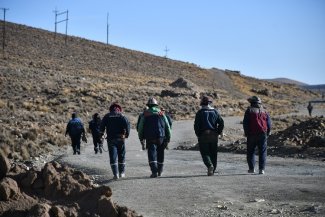Each year progress towards the Sustainable Development Goals (SDGs) is reviewed with the aim of identifying pitfalls and ensuring progress remains on track.
Governments, institutions, the private sector, trade unions and civil society all come together at the United Nations headquarters in New York for the lofty sounding High-Level Political Forum on Sustainable Development, referred to by insiders as the HLPF.
This year, the theme of the HLPF was ‘transformation towards sustainable and resilient societies’. The UN’s official Sustainable Development Report 2018 highlighted climate change, conflict, growing inequality and rapid urbanisation amongst the challenges.
Ahead of the big event, International Trade Union Confederation (ITUC) general secretary Sharan Burrow highlighted what such a transformation would mean for working people: the opportunity for a people-centred approach built on the scaling up of the ‘just transition’ model versus the risk of further marginalising those most exposed to the consequences of inadequate climate action, with its dire consequences for the long-term stability of societies.
Core to just transition is the idea that you cannot achieve policies that deliver for working people and their families without having workers’ interests represented in policy-making. Social dialogue does just that by bringing together workers, employers and often governments too. It has been central to development success-stories, past and present.
It is famously the backbone of the Nordic model, which has consistently delivered the most inclusive societies according to any established measure of development. In Uruguay, social dialogue continues to be instrumental in developing what is routinely upheld as the example of what is possible for social security in a developing country. It maintains the trust and societal consensus that maintains Ghana as one of Africa’s leading democracies.
While these are but a few of the many positive examples, using social dialogue to achieve sustainable development remains the exception rather than the rule.
Losing our way
The tools set up to ensure society’s much-hailed transformation are simply missing in action. Public budgets are dwindling, not because of the lack of funding available, but because of the use of corporate loopholes to undermine national tax systems globally and the imposition of fiscal adjustments by the International Monetary Fund. As a result, wealth is being accumulated in the hands of a tiny minority who are stashing it away in the murky world of offshore banking. Starved of resources, key public responsibilities such as health, education and social protection are increasingly being passed over to the private sector, or to households.
Meanwhile, Official Development Assistance (or ODA, the resources that advanced economies allocate to the global push for development) is being reduced and increasingly diluted. There is a move towards increasing the use of ODA to ‘leverage’, ‘de-risk’, ‘blend’ or otherwise attract private finance to contribute to development, with the aim of boosting the overall resources for development from “billions to trillions”.
When blending resources, the objectives of the investments are also blended, not to say distorted. While job creation, for example, is a major claimed benefit of the blended finance approach, next to no provisions are made to ensure that the jobs created are empowering rather than exploitative. Rather, the current setup results in a lack of local ownership, a lack of mutual accountability and simply does not deliver development results.
Strong and legally enforceable public oversight is needed to ensure the transparency and accountability of the private sector as well as its compliance with environmental and social standards.
Far from ensuring accountability, governments stand by while working people’s freedom of association and collective bargaining rights are under attack. Worse still, sometimes it is governments themselves that are behind these attacks: the number of countries with arbitrary arrests and detentions of workers, for example, increased from 44 in 2017 to 59 in 2018. As Paola Simonetti, director of the ITUC’s Trade Union Development Cooperation Network explains, these rights are fundamental to achieving decent work for all.
While at the HLPF, we were rocked by news from Colombia of the murder of yet another trade unionist, a brutal reminder of the reality faced by working people. Examples of different rights abuses were routinely put to governments. That they were able to simply avoid answering civil society questions highlights the worrying lack of accountability within the HLPF.
There is an increasing disconnect between the official narrative of progress that we heard during the HLPF and the urgent need for action on the ground. Rather than being the cockpit that keeps us on the right trajectory, the HLPF is becoming, as one civil society representative put it, “a celebration of small things that pretend to work”. Without strong, action-oriented commitments to overcome the obstacles, the SDGs will simply not be achieved.
A crucial juncture
Fortunately, there is some space for change. The truly transformative potential of the near-universal recognition of the SDGs could yet be salvaged, at least in part. The review of the HLPF process in parallel to the UN reforms, which take place over the next 12 months, comes at a critical time.
So far, it is hard to see this process delivering truly progressive reform. The USA and Israel’s vote against a Ministerial Declaration that mainly reiterated previous commitments is symptomatic of a multi-lateral system on tenterhooks. While HLPF reform is unlikely to result in the process being given real teeth, a lot can be done in the way of guaranteeing a space for trade unions and civil society to play the crucial role of holding governments and the private sector to account.
A few years ago, it would have been hard to have predicted the adoption of the SDG – and yet it happened. There are some hints that the stars may be aligning for next year: with the HLPF’s focus on ‘empowering people and ensuring inclusiveness and equality’ (with Goal 8 on decent work as its centrepiece), as well as with the ILO Centenary, there is the possibility for real impact. As a result, trade unions must use this opportunity to push back against the shrinking of space for their engagement at a national and international level.










